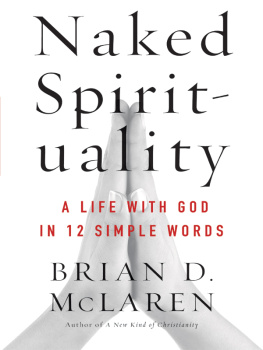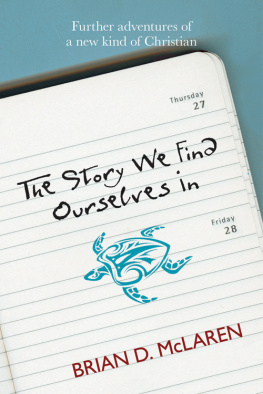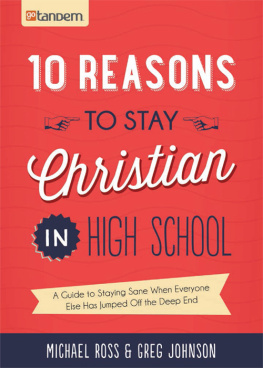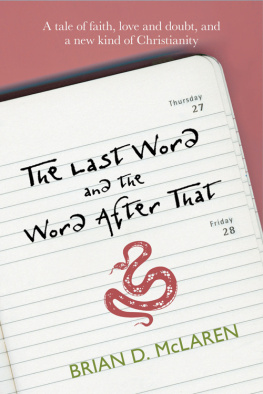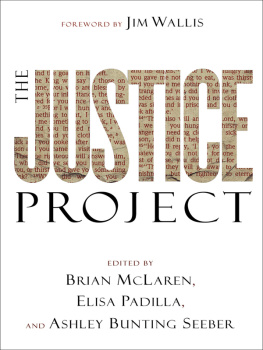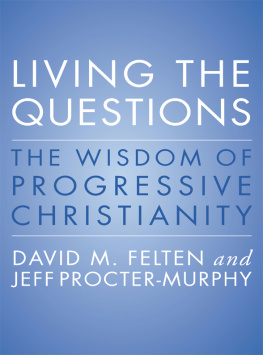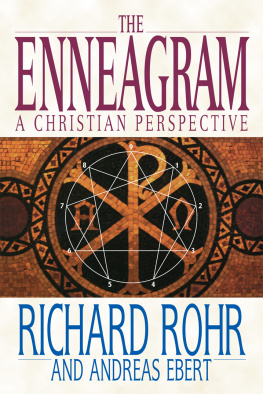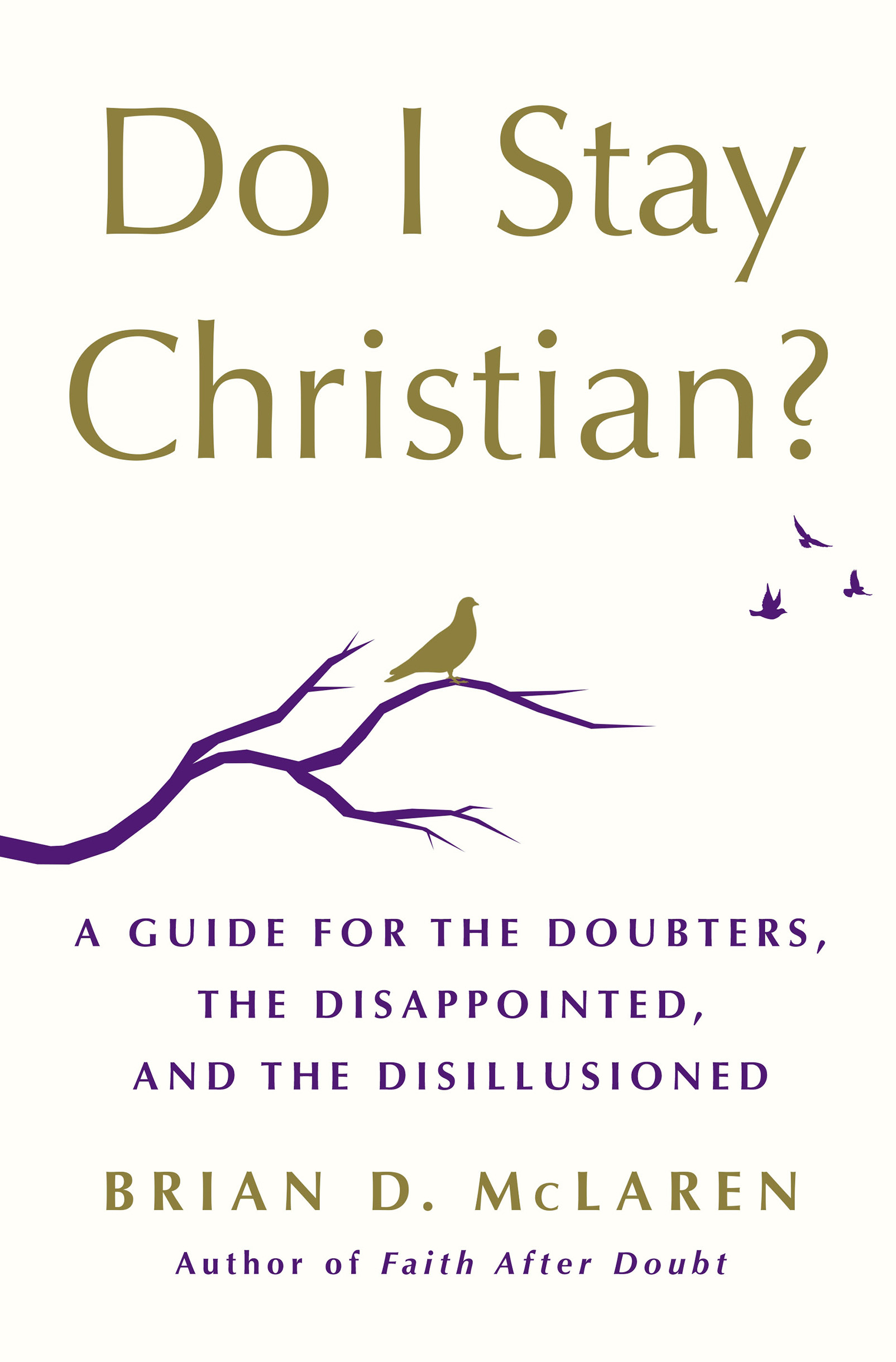Contents
Guide
Pagebreaks of the print version

The author and publisher have provided this e-book to you for your personal use only. You may not make this e-book publicly available in any way. Copyright infringement is against the law. If you believe the copy of this e-book you are reading infringes on the authors copyright, please notify the publisher at: us.macmillanusa.com/piracy.
This book is dedicated to two dear friends whose presence and absence I will always associate with the writing of this book.
Bill Duncan died of COVID-19 in March 2021. Bill was my friend across five decades of life, and he was my partner in planting a new church in the early 1980s (Cedar Ridge Community Church, http://crcc.org/). It is one of the greatest blessings of my life to have had such a wise, deeply rooted, forgiving, supportive, and delightful friend. Bill was kind enough to read my books and offer me encouragement about each one. I am quite certain this book would have been his favorite, and he would have said something like, I think you finally were able to say what youve been striving to say for your whole adult life.
Fran McKendree was a gifted singer, songwriter, guitarist, and worship leader whose music and friendship brightened my life, especially over the last decade. While he was undergoing treatment for aggressive cancer in 2020 and 2021, he produced some songs that I had written or co-written with him. (You can find some of them here: http://brianmclaren.net/celebrating-a-life-of-wonder-goodness-and-creativity /). He passed away in June 2021. These lines from his song Haul Away could serve as an epigram for this book (from Times Like These, McKendree Spring, 2013, available here: https://vimeo.com/119998423 /):
Break these chains and, flying, let me go.
Dance me out and let me see
How this storm can paint a rainbow
And how beginnings come to be.
It was about ten-thirty at night. I had just fallen asleep in a hotel room in San Francisco. My hotel phone jangled at full volume and I fumbled in the darkness to find it. Brian, my name is Carl. Im terribly sorry to bother you so late, and I apologize for hunting you down at your hotel, the caller said with a deep southern accent. I work for a Christian campus ministry here in the Bay Area. My whole staff team and I were at your lecture this evening, and were fans of your books, and we wondered if it would be possible for us to meet with you before you leave town. I hope thats not too presumptuous to ask.
Im sorry, I said, trying not to sound too groggy. I have to catch a plane at 9:00 a.m. That means I need to be at the airport at eight, which would mean leaving here before seven so I could return my rental car.
You dont understand, Carl said. Were desperate. Is there any way?
It turned out that Carl lived near the airport, and I agreed to meet Carls team at his apartment at 5:30 a.m. The small living room was already crowded with about a dozen people when I arrived. Delia, Carls wife, had prepared a last-minute breakfast buffet that didnt look last minute at all: scrambled eggs, sausage, fresh biscuits, toast, fruit, orange juice, and coffee. We sat around the room elbow to elbow, our breakfasts on our laps, and Delia began in a Louisiana drawl even more pronounced than her husbands: Brian, bless your heart for getting up so early to meet with a ragamuffin bunch of perfect strangers like us. I might as well get the ball rolling. We came from Louisiana to reach secular college students for Christ here in liberal, heathen San Francisco. But the truth is, theyve reached us more than weve reached them. Now, the Christianity we came here with just doesnt make much sense anymore. If I had my way, I would leave campus ministry today, and then I think Id leave Christianity tomorrow.
Carl went next, and then, one by one around the room, each person shared a similar story. Im hanging on to Christian faith by a fingernail, one said. I dont even know if theres a God anymore, said another. I had to stop reading the Bible, another said, because Im about one chapter away from complete atheism.
When we came full circle back to Delia, she said, When we heard you speak last night, we felt that you might understand our predicament and be able to help us. We just dont know what to do.
By this time, it was 6:20, and I realized I only had forty minutes before I needed to leave for the airport. What could I say in forty minutes to help these sincere and conflicted people?
Fast-forward twenty years, and I found myself in a similar conversation, this time in a Chinese restaurant just outside Chicago. I looked around the table and saw a sampling of Mainline Protestant clergy: an Episcopal priest and a Presbyterian pastor to my left, two Methodists and a Lutheran across from me, and two post-Evangelicals now in the United Church of Christ to my right. They were the organizers of a daylong event for clergy at which I had just spoken.
One of the Methodist pastors across from me had just told our little group that she had seriously considered leaving ministry earlier in the year. Then she caught my eye: Brian, do you ever feel tempted to just throw out the whole thing and do something else with your life?
Sometimes I do, I said. Lately, more often than youd think.
Everyone froze for a second. My companions clearly didnt expect my admission.
One of the post-Evangelicals to my right leaned toward me and made eye contact over his reading glasses. I think Jesus would be pretty embarrassed about what weve made of the movement he started, he said. Sometimes I think he wouldnt want to be a part of it either.
Over their kung pao chicken, egg drop soup, and vegetarian fried rice, one by one my companions shared their ambivalence not just about staying in ministry, but about staying Christian.
I cant count how many similar conversations have unfolded since that early morning breakfast with Evangelicals in San Francisco and that dinner with Mainline Protestants near Chicago. Surprising numbers of Roman Catholics have told me, almost as if reading from the same script, I have no hope for the church reforming or renewing. My only hope is that it collapses and dies soon, before it does too much more harm, so something new can be resurrected. Others had hope for renewal but talked in terms of centuries, not years or even decades. Latter-Day Saints, Adventists, Unitarians, and many others have reached out to me about their similar spiritual frustrations in their unique contexts.
As I recall these conversations, I hear echoes of literally thousands of others in hallways, over meals, via email, or in chance encounters in airports. I wouldnt be a Christian anymore if I hadnt found your books, a young youth pastor told me in a book-signing line. I was a Mennonite pastor for twenty years, a middle-aged man explained at an event, but this is the first time Ive set foot in a church of any kind since I left the pastorate seven years ago. These days I call myself post-Christian. You saved my life (spiritually speaking) through your books while I was deployed in Iraq, a military chaplain wrote me. I came out as an atheist and left Christianity, a former Methodist minister wrote. Maybe my journey would have been different if Id met people like you in time.
Over time, Ive come to realize that when people speak of leaving Christianity, part of their struggle is that Christianity


